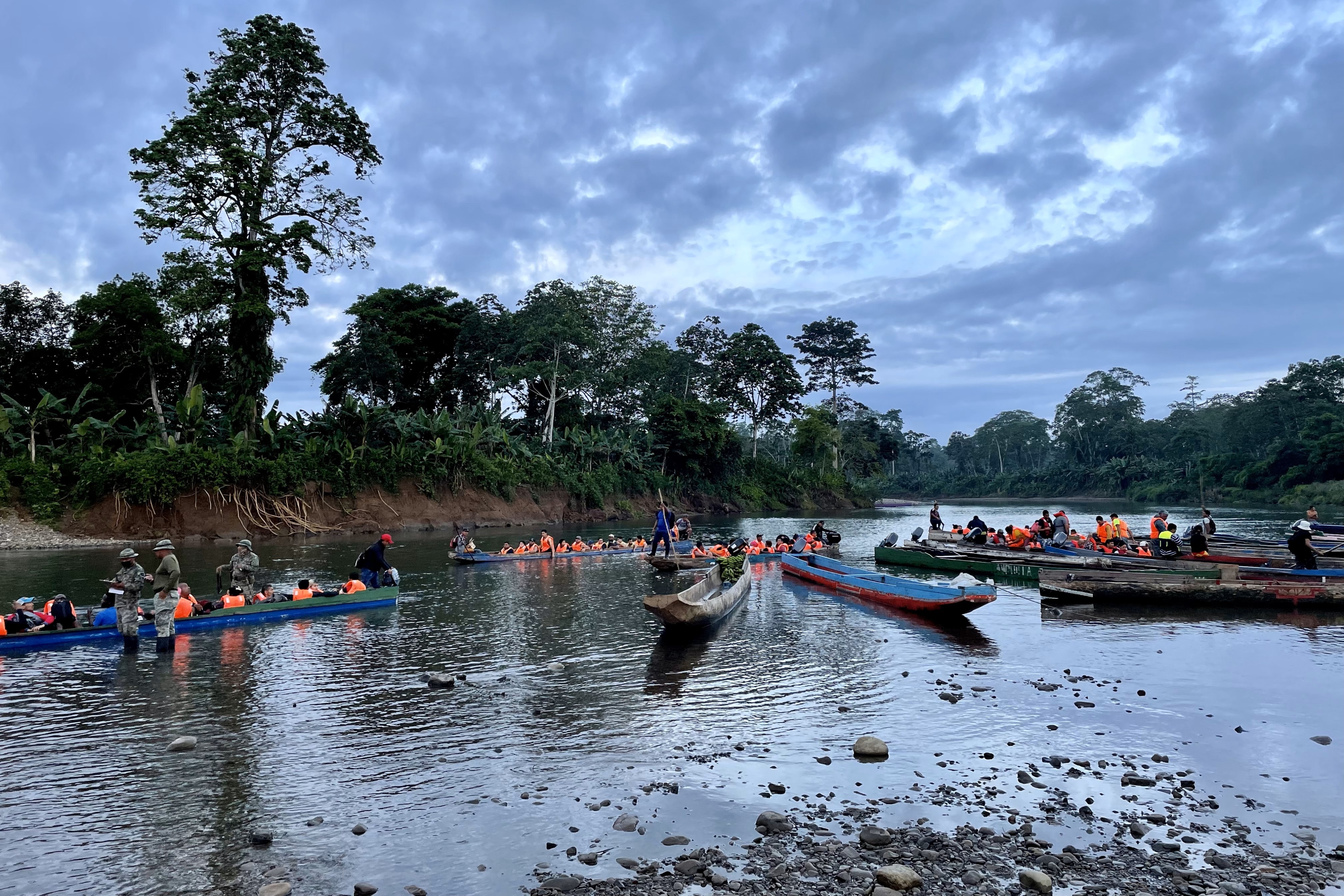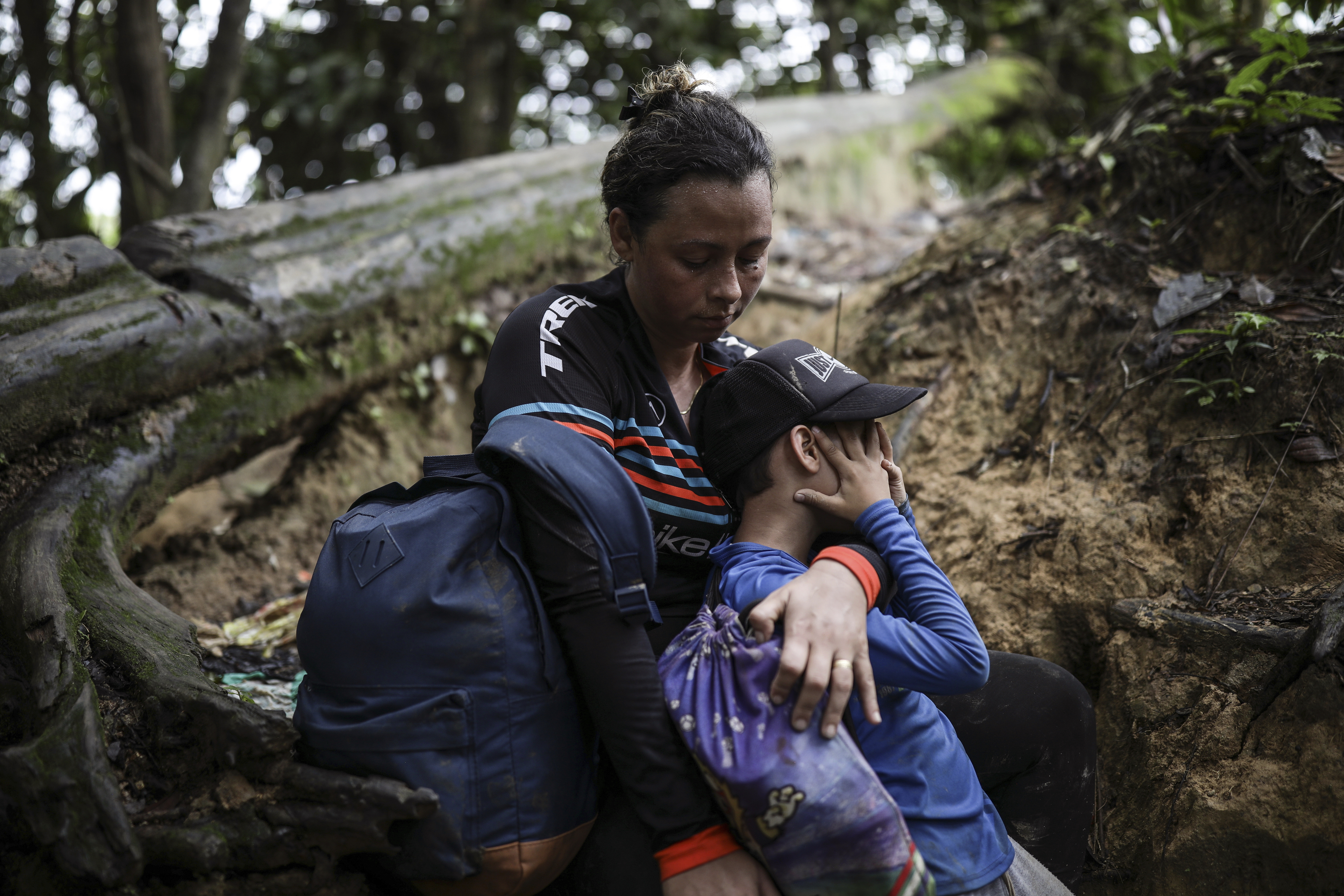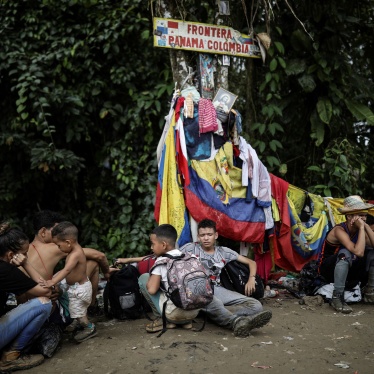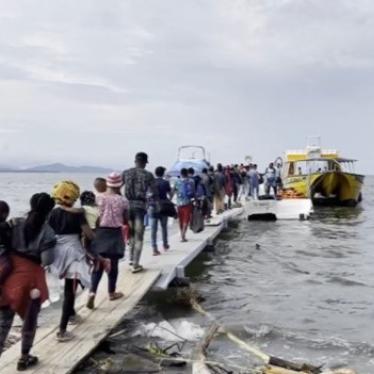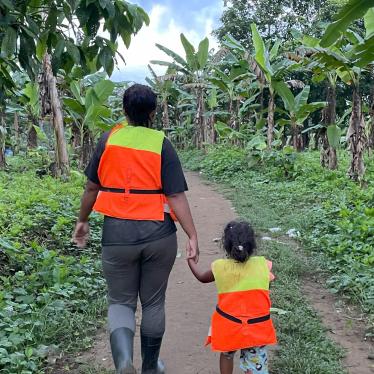- Limited and, at times, poor regularization and integration policies in Latin American countries have forced many migrants and asylum seekers into the dangerous Darién Gap.
- Over the last year and a half, over 700,000 migrants and asylum seekers have crossed the Darién Gap, where they are exposed to abuses, including sexual violence.
- As the crises in Venezuela and Haiti deepen, governments in the Americas should take urgent steps to expand access to asylum, regularization processes, and meaningful social and economic integration opportunities.
(Bogotá) – Governments in the Americas offer inadequate access to asylum and other forms of international protection for people fleeing ongoing human rights crises, including in Venezuela and Haiti, Human Rights Watch said in a report released today.
The report, “Darién Gap: The Jungle Where Poor Migration Policies Meet,” analyzes migration policies in six countries in the region, Brazil, Chile, Colombia, Ecuador, Panama, and Peru, identifying the key problems migrants and asylum seekers face in regularizing their migration status, gaining refugee recognition, and accessing social and economic integration. The report, the third in a series of Human Rights Watch publications on migration via the Darién Gap, provides examples of how these limited policies push migrants and asylum seekers to move north across the jungle.
“Governments in the Americas should not stand idly by as the crises in Venezuela and Haiti deepen,” said Tirana Hassan, executive director at Human Rights Watch. “They should respect and promote human rights domestically and grant those fleeing meaningful opportunities to obtain protection and remake their lives.”
In the past year and a half, over 700,000 migrants and asylum seekers have crossed the Darién Gap, fleeing violence, persecution, and humanitarian catastrophes. These include over 477,000 Venezuelans, 60,000 Ecuadorians, and 41,000 Haitians.
Human Rights Watch visited the Darién Gap six times between April 2022 and September 2024 and interviewed over 300 people. Those interviewed included migrants and asylum seekers who had or were about to make the crossing, humanitarian workers, Colombian and Panamanian authorities, and migration experts from across the region. Researchers also reviewed data and reports by the governments of Colombia, Panama, and the United States; United Nations agencies; international, regional, and local human rights and humanitarian organizations; and local legal clinics.
In Venezuela, international observers have raised serious concerns about the July 29 announcement by the National Electoral Council that Nicolás Maduro had been re-elected president on July 28, 2024. Following the election, Venezuelan authorities have committed widespread human rights abuses against largely peaceful protesters, opposition leaders, and critics. On September 2, a judge ordered the arrest of presidential opposition candidate Edmundo González, who received the most votes according to the Carter Center, which observed the election.
In a survey conducted in Venezuela after the election, 43 percent of those who responded were considering leaving the country, including 1.5 million people who were planning to do so before the end of the year.
Despite the recent establishment of a transitional government, Haiti has faced a prolonged political crisis, which has left the country without any democratically elected officials and unable to ensure security and access to essential services for its population. About 300 criminal groups now control much of the capital, Port-au-Prince, and its metropolitan area, resulting in nearly 3,500 deaths in the first half of 2024.
This violence has forced nearly 600,000 people into internal displacement between January and June, with criminal groups frequently using sexual violence, including collective rape, and kidnapping to terrorize and control neighborhoods. Haiti is also facing a catastrophic humanitarian situation, with 5.5 million people, nearly half of the population, in need.
The surge in Ecuadorian migrants and asylum seekers has been fueled by a sharp rise in crime and violence in the country, with record rates of homicide and extortion. Poverty and the lack of adequate employment are also key factors.
Human Rights Watch found that some Latin American governments have made commendable efforts to receive migrants and asylum seekers. However, limited options for regularization, poor access to asylum, and limited integration programs have left hundreds of thousands unable to remake their lives, forcing many to head north.
While the exact number of people leaving each country in South America across the Darién Gap is hard to calculate, surveys conducted by the Office of the United Nations High Commissioner for Refugees (UNHCR) between January and July in the Darién Gap show that between 45 and 67 percent of Venezuelans who crossed the jungle had lived in other countries in South America.
A recent US-Panama agreement under which the US will pay Panama to “remove foreign nationals who do not have a legal basis to remain in Panama” is likely to worsen access to asylum in the Americas, Human Rights Watch said. Given Panama’s inadequate and under-resourced asylum system, large-scale removal of asylum seekers could violate Panama’s legal obligation to respect the principle of nonrefoulement, that is not returning people to a place where they are likely to experience abuse. It also means that the US would shirk its responsibilities by outsourcing its migration controls to a country with demonstrably less capacity to provide full and fair consideration of asylum claims.
Efforts to regularize migration in the region have often fallen short due to restrictive timelines, complex procedures, onerous document requirements, and administrative delays. The asylum systems also struggle with limited capacity, resulting in significant delays and an inconsistent application of the Cartagena Declaration, which calls for broad protection for refugees.
While there have been some local initiatives to improve migrant integration, the absence of clear social and economic integration strategies has left many migrants without adequate jobs and facing difficulties in accessing health care, housing, education, and social programs. Discrimination and xenophobia, including sexual harassment connected to these, are increasingly common.
The 40th anniversary of the 1984 Cartagena Declaration is an opportunity for governments to seek coordinated solutions to the migration challenges in the region and to adopt rights-respecting policies that should ensure access to safe and legal pathways for migration, effective regularization processes, and meaningful social and economic integration opportunities, Human Rights Watch said. Governments should draw lessons from valuable polices across the region, including Brazil’s prima facie recognition for Venezuelans as refugees and past humanitarian visas for Haitians, as well as Colombia’s efforts to grant temporary protection status for Venezuelans.
Governments should create a region-wide temporary protection system that would grant all Venezuelans and Haitians legal status for fixed but renewable terms of adequate duration and create an equitable regional mechanism to determine the states responsible for examining asylum claims and protecting refugees, Human Rights Watch said.
“The worsening crisis in Venezuela and Haiti means governments in the Americas, including the United States, need to step up their response to meet the challenges posed by increased migration,” Hassan said. “They should urgently work toward a regional coordinated response that ensures protection for people leaving human rights crises across the region.”
